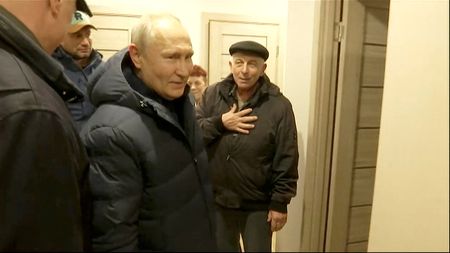By Lidia Kelly and Mark Trevelyan
(Reuters) -A day after being accused of war crimes by the International Criminal Court, President Vladimir Putin made a surprise visit to the Russian-occupied Ukrainian city of Mariupol, scene of some of the worst devastation of his year-old invasion.
State television showed extended footage of Putin being shown around the city on Saturday night, meeting rehoused residents and being briefed on reconstruction efforts by Deputy Prime Minister Marat Khusnullin.
The port city of Mariupol became known around the world as a byword for death and destruction as much of it was reduced to ruins in the first months of the war, eventually falling to Russian forces in May.
Hundreds were killed in the bombing of a theatre where families with children were sheltering. The Organization for Security and Cooperation and Europe (OSCE) said Russia’s early bombing of a maternity hospital there was a war crime. Moscow denied that and has said since it invaded on Feb. 24 last year that it does not target civilians.
Putin’s visit had the air of a gesture of defiance after the ICC issued a warrant for his arrest on Friday, accusing him of the war crime of deporting hundreds of children from Ukraine.
He has not publicly commented on the move, but his spokesman said it was legally “null and void” and that Russia found the very questions raised by the ICC to be “outrageous and unacceptable”.
An adviser to Ukrainian President Volodymyr Zelenskiy said the visit to the devastated city was tantamount to a perpetrator returning to the scene of the crime.
“The criminal always returns to the crime scene,” Mykhailo Podolyak wrote on Twitter.
“As the civilized world announces the arrest of the ‘war director’ (VV Putin) in case of crossing its borders, the murderer of thousands of Mariupol families came to admire the ruins of the city & graves. Cynicism & lack of remorse.”
The visit to Mariupol was the first that Putin has made to the Russian-occupied parts of Ukraine’s Donbas region since the war started, and the closest he has come to the front lines.
While Zelenskiy has made a number of trips to the battlefield to boost the morale of his troops and talk strategy, Putin has largely remained inside the Kremlin while running what Russia calls its “special military operation” in Ukraine.
Kyiv and its allies say the invasion is an imperialistic land grab that has killed thousands and displaced millions of people in Ukraine.
‘PIECE OF HEAVEN’
Putin’s trip to Mariupol took place in darkness. State TV showed him at the wheel of a car, driving through the city in the company of his deputy prime minister, Khusnullin, and being briefed in detail on the rebuilding of housing, bridges, hospitals, transport routes and a concert hall.
State media said he visited a new residential neighbourhood that had been built by Russian military with the first people moving in last September.
“Do you live here? Do you like it?” Putin was shown asking residents.
“Very much. It’s a little piece of heaven that we have here now,” a woman replied, clasping her hands and thanking Putin for “the victory.”
Residents have been “actively” returning, Khusnullin told Putin. Mariupol had a population of half a million people before the war and was home to the Azovstal steel plant, one of Europe’s largest, where Ukrainian fighters held out for weeks in underground tunnels and bunkers before being forced to surrender.
“The downtown has been badly damaged,” Khusnullin said. “We want to finish (reconstruction) of the centre by the end of the year, at least the facade part. The centre is very beautiful.”
Mariupol is in the Donetsk region, one of four largely Russian-occupied regions of Ukraine that Putin in September moved to annex in an action rejected as illegal by most countries at the United Nations General Assembly.
Putin travelled there by helicopter after a visit to Crimea on the ninth anniversary of its annexation by Russia from Ukraine.
From Mariupol, he went to Rostov in southern Russia, where state TV on Sunday showed him meeting Chief of the General Staff Valery Gerasimov, commander of Russia’s war effort in Ukraine.
(Reporting by Lidia Kelly in Melbourne and Mark Trevelyan in London; Editing by Frances Kerry, Ron Popeski and Mark Porter)





